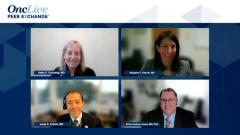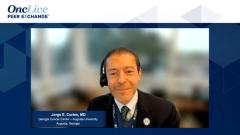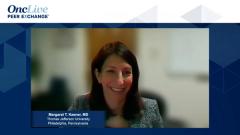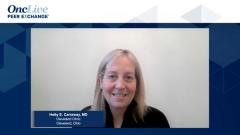
Optimizing Management of TP53-Mutated Acute Myeloid Leukemia
Expert oncologists highlight challenges in the setting of TP53-mutated AML and consider appropriate treatment strategies.
Episodes in this series

Transcript:
Jorge E. Cortes, MD: Before we move on to our unfit patients, Margaret [Kasner], you mentioned the difficulties with the patients with TP53 mutations. That’s been a very tough challenge. Brian, how do you approach these patients with what we have available? What’s your standard therapy for these patients?
Brian Andrew Jonas, MD, PhD: That’s 1 of our biggest challenges in the field: what to do with these patients. Fortunately, they’re not the most common mutation, thank goodness, but the impact of intense chemotherapy is not good with these patients. Everyone would agree that the response rates and the survival aren’t good. The toxicities are significant. This extends to CPX-351 [liposomal cytarabine-daunorubicin] as well…so TP53 will be a miss in pretty much all these approaches.
A clinical trial is the way to go with these patients, and not everyone is going to have access to a clinical trial. So when you’re thinking about what you might do when no clinical trial is available—not everyone agrees with this, and I’ve heard different opinions recently—I still favor the use of HMA [hypomethylating agent]–venetoclax in the front line for a TP53-mutated patient. We’re not thinking that the high-intensity therapy is going to benefit [these patients]. The response rates are higher than with azacitidine alone, so you have a better chance of getting them to remit. If they’re a candidate, then you could potentially take them to transplant. I recognize that there’s not a ton of evidence to back that up, and there’s not a ton of evidence of how to best treat these patients.
There’s a lot of interest in some of the novel experimental drugs, like magrolimab, which all of us are hoping will provide benefit for the TP53-mutated subpopulation. When there’s a clinical trial available that has that drug, I want a patient to look at that trial. It’s a challenge for many patients who may not have access to a clinical trial. To summarize the discussion, 1 way is to have providers recognize the significant challenge of these patients and see if there’s an ability to get patients to a center that might have a clinical trial with a TP53-targeting agent or an agent that seems to have activity in that subset, because the standard approaches are not promising, unfortunately.
Jorge E. Cortes, MD: It’s a very difficult population. We all emphasize the need to transplant these patients. The No. 1 challenge is if their response to standard chemotherapies is lower than it is for other patients. Fewer patients can get to transplant, and bad disease features are bad disease features no matter what you do. Even the outcomes after transplant aren’t what we’d like them to be. That’s the best thing you can do for those patients. But even for that setting, we need better approaches. I see Hetty raising her hand. Then we need to move on because we still have a lot of ground to cover.
Hetty E. Carraway, MD: Not all TP53-mutated patients are treated the same or have similar outcomes, There’s biallelic and single TP53. Another important distinction for us to be mindful of is that not all TP53-mutated patients are the same. In fact, the challenge is that even if patients have positive TP53 as evidence on MRD [minimal residual disease] testing, we need to ask the question, is this a germline TP53 mutation or something that’s representative of their disease? Especially as they’re headed to transplant. Transplant teams are often saying, “You can’t proceed to transplant if you still have MRD evidence of TP53. That’s the case as long as it’s not a germline mutation. We are challenged by each of those things. We don’t always include that as part of our work-up. I agree that clinical trials are essential in this patient population, as is the conversation with the patient and their loved ones about our expectations of cure with the mortalities we have.
Transcript edited for clarity.











































